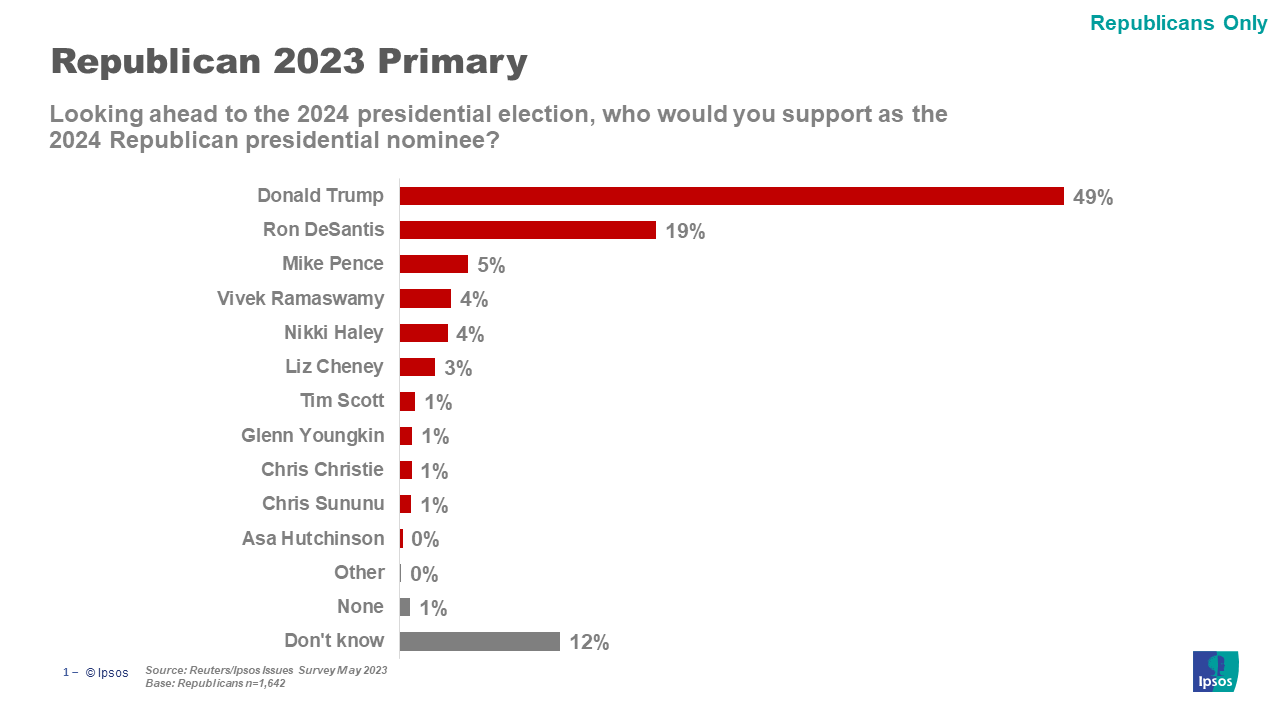Reuters/Ipsos Issues Survey May 2023
Washington, DC, May 16, 2023– The May 2023 Reuters/Ipsos Issues Survey looks the 2024 presidential election, the debt ceiling and other issues. The survey shows that former president Donald Trump is the Republican favorite for the presidential nomination. The survey also looks at the debt ceiling debate in Congress and finds that three-quarters of Americans are concerned that the risk of default will hurt them or their families.
Detailed Findings: 2024 Presidential Election Primary
Former President Donald Trump leads the Republican primary field, receiving 49% of Republican support, a five-point increase since March 2023 (44%), followed by Florida Governor Ron DeSantis (19%). For DeSantis, this is an eleven-point drop since March 2023 (30%). In the general election, among registered voters, President Joe Biden (41%) has a a slight edge over Ron DeSantis (37%), and Biden (44%) also enjoys a lead against Donald Trump (38%). In a three-way race, between Biden (42%), DeSantis (22%) as a Republican, and Trump (22%) as an independent, Biden has a plurality of support, while DeSantis and Trump are tied.

Detailed Findings: Debt Ceiling and Federal Deficit
A slim majority of Americans (52%) report having seen, read or heard a fair amount or more about the debt ceiling debate in Congress, this is up six-points since March (46%). Nearly two in five Americans (39%) support raising the debt ceiling, up seven points from March (32%), while opposition (28%) has dropped nine points from March (37%). The number of Americans who are unsure on the issue is statistically unchanged at 34%. Eighty-two percent of Americans are concerned about a risk of recession for the U.S. economy if a deal is not reached, this includes equal proportions of Republicans (87%) and Democrats (85%). Seventy-seven percent are also concerned about the risk of financial harm to themselves or their family, including 82% of Republicans and Democrats (82%), if Congress and the White House are unable to reach a deal on the debt ceiling.
Detailed Findings: Artificial Intelligence (AI)
Just under seven in ten Americans say they are concerned about the increased use of artificial intelligence (AI) (68%). About two in three Americans say that AI will have unpredictable consequences that we ultimately won’t be able to control (67%), and half (52%) say AI is bad for humanity. Three in five Americans believe the uncontrollable effects of AI could be so harmful that it would risk humankind’s future (61%), a similar percentage say that companies replacing workers with AI should pay a penalty to offset the increased unemployment (62%).
About the Study
These are some of the findings of an Ipsos poll conducted between May 9-15, 2023 on behalf of Thomson Reuters. For this survey, a sample of 4,415 adults age 18+ from the continental U.S., Alaska, and Hawaii was interviewed online in English. The sample also includes 2,089 Democrats, 1,642 Republicans, and 477 independents.
The sample was randomly drawn from Ipsos’ online panel, partner online panel sources, and “river” sampling and does not rely on a population frame in the traditional sense. Ipsos uses fixed sample targets, unique to each study, in drawing a sample. After a sample has been obtained from the Ipsos panel, Ipsos calibrates respondent characteristics to be representative of the U.S. Population using standard procedures such as raking-ratio adjustments. The source of these population targets is U.S. Census 2022 American Community Survey data. The sample drawn for this study reflects fixed sample targets on demographics. Post hoc weights were made to the population characteristics on gender, age, race/ethnicity, region, education and political party affiliation.
Statistical margins of error are not applicable to online non-probability polls. All sample surveys and polls may be subject to other sources of error, including but not limited to coverage error and measurement error. Where figures do not sum to 100, this is due to the effects of rounding. The precision of Ipsos online polls is measured using a credibility interval. In this case, the poll has a credibility interval of plus or minus 1.8 percentage points for all respondents. Ipsos calculates a design effect (DEFF) for each study based on the variation of the weights, following the formula of Kish (1965). This study had a credibility interval adjusted for design effect of the following (n=4,415, DEFF=1.5, adjusted Confidence Interval=+/-3.3 percentage points).
The poll also has a credibility interval of plus or minus 2.6 percentage points for Democrats, plus or minus 3.0 percentage points for Republicans, and plus or minus 5.5 percentage points for independents.
For more information on this news release, please contact:
Chris Jackson
Senior Vice President, US
Public Affairs
+1 202 420-2025
[email protected]
Annaleise Lohr
Director, US
Public Affairs
[email protected]
About Ipsos
Ipsos is one of the largest market research and polling companies globally, operating in 90 markets and employing over 18,000 people.
Our passionately curious research professionals, analysts and scientists have built unique multi-specialist capabilities that provide true understanding and powerful insights into the actions, opinions and motivations of citizens, consumers, patients, customers or employees. Our 75 solutions are based on primary data from our surveys, social media monitoring, and qualitative or observational techniques.
Founded in France in 1975, Ipsos is listed on the Euronext Paris since July 1st, 1999. The company is part of the SBF 120 and the Mid-60 index and is eligible for the Deferred Settlement Service (SRD).
ISIN code FR0000073298, Reuters ISOS.PA, Bloomberg IPS:
FP www.ipsos.com



